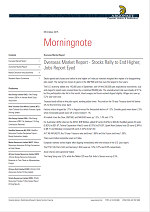Market Update & Important Indicators
The S&P 500 edged lower Monday, as declines in the energy sector offset gains in shares of health-related companies. The broad index wobbled in a narrow range for much of the session, extending a recent pattern of quiet trade. Moves in the stock market have been muted over the past week, with trading volumes across exchanges owned by the New York Stock Exchange and Nasdaq hitting their lowest levels of the year Friday. Investors and analysts have attributed the lull in action to the scarcity of major economic data and the winding down of the second-quarter earnings season. The Dow Jones Industrial Average fell 18 points, or 0.1%, to 21795 on Monday, with a decline in insurer Travelers Companies accounting for the bulk of the move. The S&P 500 fell less than 0.1%, and the Nasdaq Composite added 0.3%. Energy stocks in the S&P 500 fell with oil prices as investors struggled to gauge the fallout from Tropical Storm Harvey, which has disrupted operations at major refiners in Texas. The S&P 500 energy sector fell 0.6%, on course for its worst month since at least 2015, even after a number of oil companies reported stabilizing earnings. The U.S. gold price gained strongly overnight, adding 1.4% to close at 1,309.50 US$/oz. At the time of writing, the U.S. gold price was trading at $1,320.35.
European stocks finished lower as the euro hit its highest level against the dollar in more than two years, while energy shares declined in the wake of refinery shutdowns prompted by then-Hurricane Harvey that pummelled Texas. Trading was closed on the FTSE 100 as the U.K. observed the August Bank Holiday, meaning trading volumes were lighter than usual. The Stoxx Europe 600 index fell 0.5% to 372.29, near session lows. The pan-European index on Friday ended the session 0.1% lower and finished the week down by less than 0.1%.
Asia-Pacific equity markets struggled to find direction, though China-related stocks rose on firm corporate earnings figures. The Nikkei Stock Average was flat, constrained by a stronger yen. Stocks in China were higher, however, with the Shanghai Composite Index gaining 0.9%, driven by gains in banking stocks on expectations of solid first-half earnings. Hong Kong's benchmark Hang Seng Index surrendered most earlier gains to finish just 15points higher at 27,863, still a new 27-month closing high. Singapore's Straits Times Index pared early losses to end 0.3% higher, buoyed by banking and real-estate stocks. Korea's Kospi was off 0.4%.
Australia's big banks led broad selling to pull the equities market down for a second straight session. After a sharp fall at the bell, the S&P/ASX 200 bumped along in a narrow range to finish down 0.6% at 5709.9. The index has now dropped in 6 of the last 8 sessions. The four largest lenders each lost ground, led by Westpac Banking's 1.8% loss as it retreated a third session running. Commonwealth Bank lost 1.3% after the industry regulator said it was launching an inquiry into governance and culture in the wake of allegations of compliance failures. Qantas Airways sank 5.7%, taking back most of last week's advance following news of an executive shakeup. Still, BHP Billiton popped 0.8% even as Rio Tinto and other big miners retreated.
The London Metal Exchange was closed for the U.K. August bank Holiday.
In this issue
Austal (ASB) | Growing confidence in US margin | BUY
Market Cap $596m | Current Price $1.705 | Valuation $1.96
Solid performance from the US last financial year did two things. It underpinned $58.7m group underlying EBIT in FY17 and gave ASB the confidence to upgrade margin guidance for US shipbuilding from 5-7% to 6-8%. US ships’ revenue in FY17 was $849m, so it implies a meaningful uplift. It offsets current weak earnings in Australia and the Philippines, where work transition has impacted revenue and profit recognition. There is cause for optimism for both these regions given significant recent intake of ferry contracts and upcoming potential naval work. We expect a marked earnings pick-up in FY19, a year which could see all three regions delivering in tandem. It helps lift our valuation to $1.96 (prior $1.80) and brings us to upgrade to buy (prior hold).
Pacific Energy (PEA) | Waiting on pipeline conversion | HOLD
Market Cap $240m | Current Price $0.645 | Valuation $0.700
PEA’s FY17 result of $40m EBITDA was in-line with guidance and forecasts. Growth into FY18 is underpinned by current contracts in hand, and the Company has given guidance for FY18 EBITDA of $43-44m (representing ~9% growth). However, longer-term growth is less certain with intensifying competition, a broader shift to gas (for which PEA has less competitive advantage), and a lack of progress in Africa. We peel back long-term growth forecasts pending evidence of pipeline conversion. Until then, and given our reduced valuation of $0.70 per share, we downgrade to a HOLD (prior BUY on $0.80 valuation).
Recent Contacts & Presentations
Berkut Minerals Ltd (BMT), Draig Resources Ltd (DRG), Minotaur Exploration Ltd (MEP), Ausdrill Ltd (ASL), Neometals Ltd (NMT), PNX Metals Ltd (PNX), Northern Minerals Ltd (NTU), New Century Zinc Ltd (NCZ), Metal Bank Ltd (MBK), Rift Valley Resources Ltd (RVY), Panoramic Resources Ltd (PAN), Doray Minerals Ltd (DRM), Wellard Limited (WLD), Bryah Resources Ltd (BYH), Auris Minerals Ltd (AUR), Gage Roads Brewing Co Ltd (GRB), Stavely Minerals Ltd (SVY), Orbital Corporation Ltd (OEC), 4DS Memory Ltd (4DS), Kin Mining NL (KIN), Pharmaust Limited (PAA), Botanix Pharmaceuticals Ltd (BOT), Dimerix Ltd (DXB), Metro Mining Ltd (MMI)
Please read Argonaut's Important Disclaimers & disclosures
Log in to the client area below to download the full Morning Note PDF


